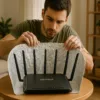Have you heard of Li-Fi? It is a wireless data transfer, which uses light waves from special LED bulbs instead of the radio waves that are familiar to everyone today. The innovative solution offers the transfer of data and information between devices using light, making it more efficient, safer and more widespread than mobile telephony base stations. Professor Harald Haas' idea has already reached the prototype stage, and in the coming years Li-Fi could completely replace Wi-Fi.
Is Li-Fi the new Wi-Fi? Wireless communications are a commodity today, like water and electricity. We use them every day in both our private and business lives. But this kind of technology has one big problem: performance. Wireless data transfer through electromagnetic waves, especially radio waves, is a limited resource. Radio waves they are rare, expensive and limited. And that's why they're not keeping up with the growing demands for wireless data transfer. At the same time, the energy they use should not be neglected radio towers or base stations, and the fact that most of it is not used for transmitting radio waves, but for cooling the stations. Then there's the problem jamming electronics. We all know about the plane story and the security problem that Wi-Fi poses in hospitals because of it. And speaking of security. Radio waves pass through walls and can be intercepted (Li-Fi allows data transmission only through a beam of light and therefore it is impossible to intercept or eavesdrop on him).
READ MORE: Simple tips on how to make your Wi-Fi signal work better

So these are the problems of the moment wireless technologies, but the solution was right in front of us all the time: in the light. There are more than 14 billion light bulbs and bulbs. And the processor Harald Haas from the University of Edinburgh, the father of connecting LED lamps, which he named Light Fidelity or Li-Fi, in an excellent TED talk, he presents the operation and advantages of the revolutionary LED lamp, which enables the transmission of information between devices via the electromagnetic spectrum with light. And all we have to do is embed a microchip in each potential light fixture. This would then combine two basic functions, namely lighting and wireless data transmission.






